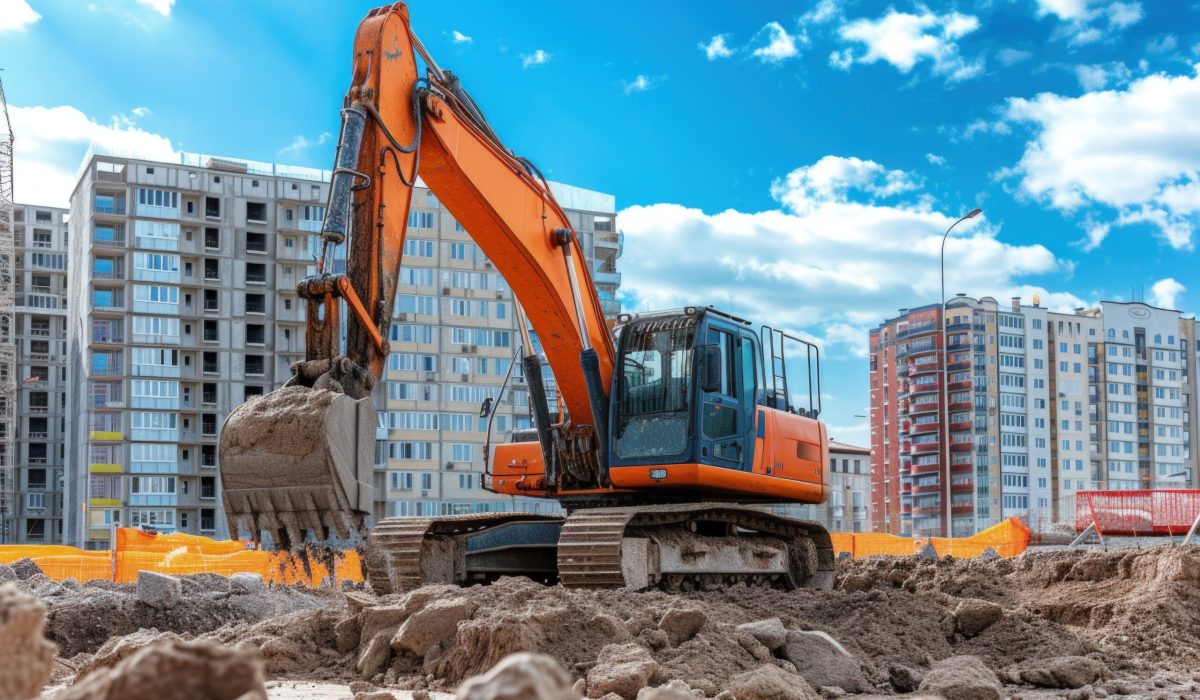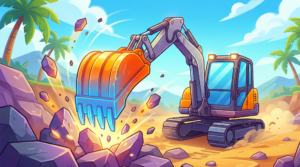The mini excavator industry is in a state of transition. This change is driven by advancements in technology and other innovations. Due to their compact design, mini excavators are used in urban construction, landscaping, and tight areas. Today, mini excavators are offering operators and contractors better efficiency, safety, and innovation to make construction work more effective. In this article, we discuss the key trends and novelties that are shaping the future of construction on a global scale.
Learn more: How Mini Excavators Improve Efficiency in Tight and Urban Spaces
1. Electric mini excavators and Sustainable Power Sources
The switch from traditional to battery-powered mini excavators is a significant move in the construction equipment sector. Battery-powered mini excavators are increasingly getting popular and for a good reason. They offer a cleaner, quieter option compared to diesel engines. With an increasing focus on environmental rules, a rising demand is seen for eco-friendly tools to cut down emissions and noise. This has led manufacturers to turn towards more sustainable options, such as electric mini excavators. These machines work perfectly well in urban environments where noise and air quality are a key concern.
Electric mini excavators are also known for efficient energy consumption. With good batteries, these machines can go for long operational hours without any disruptions to the environment. Moreover, the adoption of renewable energy sources such as solar panels for on-site charging further adds to the efforts towards sustainability. This trend is likely here to stay and further expand as a greater number of companies are now investing in high-performance electric models.
2. Automation and Smart Technology
Smart technology has been a significant influence in the mini excavator segment recently. Modern mini excavators feature GPS, sensors, and machine learning algorithms to enhance their performance. Autonomous mini excavators can carry out tasks with little human input and, hence, stand out for higher productivity and better accuracy.
Take GPS-equipped mini excavators as an example. These machines follow predetermined routes with the help of sensors. Not only does it result in precise excavation and grading but also helps avoid accidents. Similarly, machine learning algorithms work by analyzing data from past projects to improve operations. These algorithms can be trained to predict when repairs are needed, thereby keeping equipment failures at a down low.
As automation takes over the construction industry, smart mini excavators are going to be the next big thing on the market. The ability to work remotely or autonomously not only speeds things up manifold but also ensures safety by keeping staff out of harm’s way.
3. Advanced Hydraulic Systems
A hydraulic system is like the nucleus of a mini excavator. A better and more improved hydraulic system simply translates to a better-performing mini excavator. Modern hydraulic systems are designed to deliver more fluid and accurate movements, a must when carrying out delicate jobs like digging trenches or shaping landscapes.
These systems also increase energy efficiency, which again means lower fuel consumption and operating expenses. New variable hydraulic pumps offer better control of flow and pressure, adapting to different workloads and minimizing energy waste. Plus, the recent integration with electronic controls further enables operators to fine-tune their machine settings as per their specific jobs.
And it doesn’t stop there. Ongoing innovations in hydraulic technology promise to give mini excavators even more versatility and improved performance in handling complex tasks. This progression will result in a wider adoption of mini excavators across various fields in the future.
4. Telematics and Data Analytics
With the advent of telematics and data analytics in construction equipment, the mini excavator segment is sitting on the verge of a revolution. Modern excavators, equipped with telematics systems, transmit real-time data about their performance, location, fuel consumption, and more. This helps fleet managers analyze data and monitor the equipment from any location at their own convenience.
Another breakthrough feature is, Data analytics helps identify problems ahead of time. By examining data from hydraulic components, workers can detect wear indicators and plan maintenance to prevent breakdowns. This clever strategy boosts productivity and cuts costs on unexpected repairs.
In the years ahead, mini excavators will utilize more telematics and data analytics. This will yield smarter choices and better machine management. As technology improves, it will provide valuable insights to enhance machine performance and capacity.
5. Compact Design and Versatility
The high demand for mini excavators also owes to their compact design. These machines can maneuver in cramped areas, something that was impossible with larger counterparts. The future of mini excavators looks promising. We are looking at more versatile models with more customizable designs capable of handling different jobs. This means you can swap out attachments like hydraulic hammers, drills, and claws to match what you need for specific tasks.
Learn more: Top 5 Excavator Attachments for Landscapers
What’s more, Manufacturers are working ahead to enhance user experience by designing more comfortable cabs with better visibility and easier controls. A good example is the TYPHON TERROR X2 STORM Mini Excavator. This small digging machine can tackle a wide range of jobs in gardens, on farms, in parks, along roads, and in many other places.
It’s equipped with a strong 18.4kW Perkins 403J-11 engine to help it run and make maintenance straightforward. Features like a tight 360-degree turn radius, movable boom, and adjustable tracks give the TYPHON TERROR X2 STORM Mini excavator great flexibility in cramped areas. Also, with a simple design and a 500mm wide bucket, this compact powerhouse is equally navigable for experts and newbies. This is something we are not too used to experiencing with other brands.

Figure 2: Image of the Typhon Terror X2 Storm Mini Excavator, showcasing its compact size and robust design
Conclusion
The future is bright for mini excavators. Continuous efforts are being made towards improving efficiency, output, and sustainability so we can expect mini excavators to play a major role in addressing current construction problems. The next-generation excavators will set new standards in the industry by using electric power, self-operation, tech-advanced hydraulics, remote tracking, and flexible designs. This will pave the way for a more efficient and green future. With these coming changes and advances, companies that invest in the latest mini excavator tech will be in a strong position to excel in a growing and competitive field.





